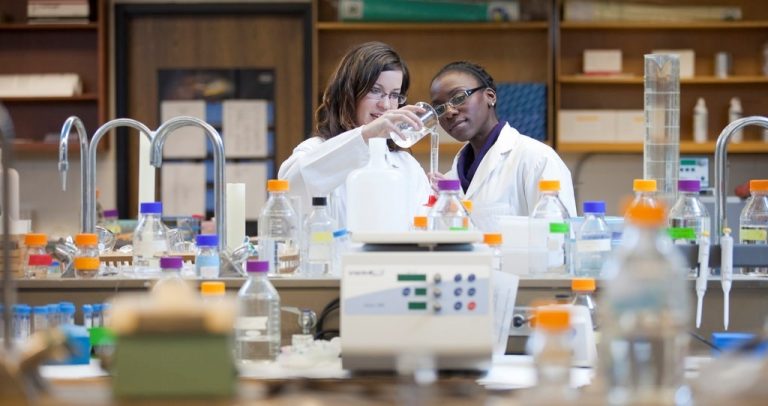
Here at the College of Arts and Science at the University of Saskatchewan, we believe education is about making positive change in the world. That is why our college is committed to forging a sustainable future and enriching society. We are proud of our graduates who have become agents of change through their outstanding research, academic scholarship and creative work that addresses the needs and aspirations of the world.
In today’s global universe, we hear about events almost as fast as they happen and view vivid images of war, famine, homelessness and natural disasters on our phones. We live in times in which societal and environmental challenges are verging on irreversible. The skills we seek to pass on to our students—critical thinking, collaboration across disciplines and cultures, community engagement, tolerance, and clear, accurate writing—will be invaluable not only in your chosen profession but as citizens of the world.
Located on one of the most beautiful campuses in Canada on the banks of the breathtaking South Saskatchewan River in Saskatoon, Saskatchewan, it’s hard to imagine a better place to explore your sense of discovery and unleash your creativity. The city of Saskatoon is a leading centre of culture and innovation, and one of the most socially-responsive cities in the country. A great partner, it is in tune with the university’s mission for community building and sustainability. It is also one of the most affordable cities in Canada, surrounded by almost five million acres of picturesque parkland.

Source: University of Saskatchewan
Making a better world starts right here at home, where the university is proudly located on Treaty 6 territory and the traditional homeland of the Métis. Students in the Indigenous Studies program work with faculty and community partners at the local, national and international level to develop healthy communities and champion social justice.
Engagement is key to ensuring that the University of Saskatchewan, College of Arts and Science is the best possible place for Aboriginal students to study and work. The College’s exceptional teaching, critical analysis and applied and community-based research provides Aboriginal students with the skills and knowledge to contribute constructively to the intellectual, cultural, political or economical capital of Aboriginal societies.
As one of the few universities in Canada to amalgamate the arts and sciences into a single college, our mission to enrich society covers many bases. We offer our students more than 60 subject areas and the in-depth, interdisciplinary knowledge essential in tackling the big issues facing today’s world. In striving for change and progress, the University of Saskatchewan, College of Arts and Science aims to stimulate creative and critical thought, foster the joy of discovery and nurture curiosity-driven research.
Our graduates are making a difference in areas that have a material impact on people’s lives. Students within the Department of Economics delve into the world of wealth to assess the many pressing financial issues facing our global society. Programs include both Economics and Business Economics and provide professional opportunities to use your newfound knowledge for positive transformation. Today, our Economics graduates work for world-changing organizations such as the United Nations, the World Bank and the International Monetary Fund.

Source: University of Saskatchewan
The comprehensive range of programs and subjects available within the University of Saskatchewan, College of Arts and Science means that many courses benefit from an interdisciplinary approach. This approach provides a solid foundation for successfully solving problems based on a multitude of perspectives. An example of this is the BA&Sc in Interactive Systems Design, which incorporates aspects from Art and Art History, Psychology and Computer Science to train students in all aspects of the design and development of the interactive systems that are now such an important part of our lives.
The Health Studies program also uses this cross-subject, collective approach, looking at the crucial, life-impacting issues of health and wellness from many different points of view. The program examines individual factors within systems – including biology, genetics, personality and psychology – to provide insight into how cultural, social and environmental contexts influence health.
Each of the subject areas at the University of Saskatchewan, College of Arts and Science has the special advantage of capitalising on the University of Saskatchewan’s incredible reputation as a leader in research. As one of the U15 Group of Canadian Research Universities, the university is part of an exclusive group that fosters the development and delivery of long-term, sustainable research policy in Canada and around the world.

Source: University of Saskatchewan
The College’s strong focus on community-engaged research and knowledge mobilization means that students have the opportunity to work alongside researchers who really are changing the world. Our university is home to many pioneering research centres, and we recognise that research excellence informs key issues like human rights, politics, social justice and wellbeing. Through the study of topics such as these, students increase their understanding of humanity and develop new ideas to push the frontiers of knowledge so vital to the evolution of society.
These leading institutes include the Toxicology Centre and the Global Institute for Water Security, from which much knowledge is gleaned for the environmental courses offered by the College. The interdisciplinary Environment and Society program contributes to policy development by seeking to understand the relationship between man and the environment – an area of expertise needed now more than ever.
We hope this has given you a hint of the opportunities on offer at the College of Arts and Science at the University of Saskatchewan. To explore further or to apply, click here.
Follow the College of Arts and Science at the University of Saskatchewan on Facebook and Twitter.
Liked this? Then you’ll love these…
A world of opportunity for Social Science Graduates
5 UK Universities producing graduates who thrive in an increasingly globalised world







